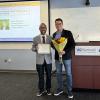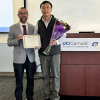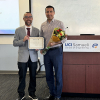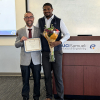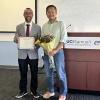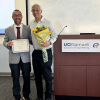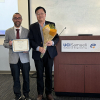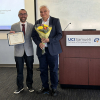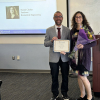Faculty Celebrated for Outstanding Service and Contributions

June 17, 2025 - “Engineers are optimistic people – we study the world as it could be, from imagination to reality,” said UC Irvine Samueli School of Engineering Dean Magnus Egerstedt to faculty and staff who gathered on June 9 for the 2025 Spring Faculty Awards.
The annual awards acknowledge and honor the valued contributions of professors in five categories -- teaching, research, innovation, service and mentorship. Awardees are selected by a voting committee that consists of the dean and associate deans.
“The end of the academic year is always hectic, so it’s nice to take a step back and spend a little time celebrating colleagues,” Egerstedt said. He noted a new award this year celebrating mentorship, a vitally important function for the school. “It demonstrates that we are in this effort together, all part of one engineering family.”
Here are the 2025 Spring Faculty Award recipients.
Excellence in Research
This recognition is bestowed upon faculty members who have conducted exceptional fundamental or applied research in one or more areas, or who have made a single or unique contribution to engineering concepts, and in which the research is responsive to or has an impact on society as a whole.
Early Career: Maxim Shcherbakov, Assistant Professor, EECS
In less than four years as a tenure-track faculty member, Shcherbakov has established himself as a rising star in the field of photonics. His groundbreaking research addresses critical socio-economic demands in high-bandwidth telecommunications, data processing and computing through light-based information and hardware. His innovative approach to understanding light-matter interactions in artificially nanostructured semiconductors and exotic materials has resulted in several recent breakthroughs, and he has been able to translate fundamental discoveries into potential technological applications.
He has more than 60 peer-reviewed journal publications and 30 invited talks and has secured more than $2.4 million in research funding. Recent recognitions include the DARPA Young Faculty Award, NSF CAREER Award and DARPA Director's Fellowship Award. Shcherbakov’s innovative research, successful funding record, impactful publications and dedication to mentoring have earned him this early career excellence in research award.
Mid-Career: Penghui Cao, Associate Professor, MAE
Cao leads a dynamic research program in the computational modeling of complex alloys under extreme conditions. His work has fundamental and broad impacts in understanding the deformation mechanisms of high-entropy alloys and gradient density materials. He has published more than 70 peer-reviewed journal articles, including three recent papers in Nature Communications. His 2022 publication on dislocation patterning featured on the cover of Science Advances is regarded as a landmark contribution in the field.
Cao has secured more than $5 million in research funding over the past few years, an exceptional achievement for a theoretical and computational research group. He also holds leadership roles in the NSF-funded Center for Complex and Active Materials at UCI and the DOE’s Center for Additively Manufactured Complex Systems under Extremes. Additionally, through his service and leadership activities, Cao has taken meaningful steps to advance inclusive excellence and broaden participation. His outstanding research and creative work, leadership and service, and commitment to inclusive excellence make him highly deserving of this award.
Senior: Amir AghaKouchak, Chancellor’s Professor, CEE
AghaKouchak is an international leader in water resources engineering known for developing novel frameworks for monitoring and predicting compound hydroclimate hazards. He has pioneered methodologies for the integration of multiple sources of information including satellite data, ground-based observations, physically based models, and advanced data-analytics methodologies for the prediction and mitigation of catastrophic extremes. He is a highly cited researcher who has published, with his group, more than 230- peer-reviewed papers.
AghaKouchak has earned numerous honors including the International Union of Geodesy and Geophysics’ Early Career Scientist Award, and the American Geophysical Union’ Early Career Hydrologic Sciences Award. He was recently named a fellow of the American Society of Civil Engineers Environmental and Water Resources Institute (2023) and is also a recipient of the ASCE Norman Medal (2022); ASCE Huber Prize (2020); and AGU James B. Macelwane Medal (2019). AghaKouchak’s groundbreaking research, original ideas and societal relevance along with his contributions to the scientific community have earned him this Samueli School recognition for excellence in research.
Innovation in Teaching
This teaching award is presented to a faculty team or individual who has made outstanding contributions to the improvement of undergraduate engineering education. It recognizes the demonstrated impact of innovation in the education process, including the design, development and application of new pedagogy, teaching tools and assessment methods. Exceptional teaching in the classroom is also considered. Selection favors those whose contributions have made important, pervasive improvements in engineering education with a significant potential for long-term impact.
Early Career: Quinton Smith, Assistant Professor, CBE
Smith integrates interactive teaching methods, real-world applications and hands-on experiences in his teaching, contributing to the overall quality of education by enhancing student engagement, comprehension and skill development. By contextualizing abstract principles within tangible examples, students are better equipped to grasp the practical significance of the derived equations and concepts. This enhances their understanding and cultivates critical thinking skills and problem-solving abilities essential for success in engineering practice.
Smith fosters an environment where questions are encouraged and explanations are clear and relatable. This approach humanizes the learning process, breaking down barriers between students and educators, and instills a sense of ownership and agency in students’ learning journey. As a result, students are more intellectually stimulated and actively engaged in the course material, leading to enhanced learning outcomes. Smith plays a pivotal role in shaping the next generation of engineering professionals and driving innovation in the field.
Mid-Career: Hung Cao, Associate Professor, EECS
Cao has an enthusiastic and engaging teaching style that is highly appreciated by his students. Through sustained efforts, he has successfully managed to enrich course content with practical problems and examples. This exposure to real world applications has helped students develop an interest in research. Noting the importance of training students on semiconductor and microelectronics, Cao initiated a special ENGR 199 class, in which undergraduate students can enter the cleanroom facility and learn microfabrication processes. He designed a special device “the Anteater microsensor,” which has the shape of our mascot, and can sense toxic gases and liquids.
He leads a large research group and through his mentorship, his former Ph.D. students have found positions at national labs and top companies. He also involves large numbers of undergraduate students in research. He serves as a capstone coordinator and DECADE mentor. Student comments testify that Hung “is always engaging and interesting” and he makes “math and physics very fun!”
Senior: Vasan Venugopalan, Professor, CBE
Venugopalan has made exceptional contributions in developing and implementing novel and impactful educational programs to support multidisciplinary training of students, researchers and industrial professionals in the area of biophotonics. His contributions have had tangible benefits for both UCI Ph.D. students across campus -- impacting the Schools of Engineering, Physical Sciences, Biological Sciences and Medicine -- as well as a larger population of academic and industrial researchers nationally and internationally.
Venugopalan’s efforts have resulted in the development of five extramurally-funded ($6.5 million in total) multidisciplinary educational initiatives, each utilizing mixed methods, for intensive research education and training, coupled with professional development and technical and career mentorship. Examples include an NSF Integrated Graduate Education, Research and Training (IGERT) program, several NIH short courses and training programs in computational and biophotonics, and a UC/HBCU program for multidisciplinary research experience for undergraduate students.
Innovator of the Year: Zhongping Chen, Professor, BME
This award is presented to an individual or team who best demonstrates innovation in the development of a product or technology. The award recognizes achievements in which the innovation has successfully translated the research emanating from our laboratories into new products and technologies that can be used by the public at large.
Chen has distinguished himself as a prolific and impactful translational researcher in biomedical optics. His innovations have advanced the frontiers of science and led to commercially viable technologies now poised to transform clinical care across ophthalmology, cardiology, otolaryngology and oncology. His work in optical coherence tomography has been integrated into clinical ophthalmology as a standard of care, allowing clinicians to noninvasively visualize retinal microvasculature, and enabling early diagnosis of diabetic retinopathy and age-related macular degeneration.
He has pushed forward the development of acoustic radiation force optical coherence elastography —a novel technique for real-time, noninvasive imaging of tissue biomechanics that could help with early detection of Alzheimer’s disease and diagnosis of glioblastoma. His endoscopic OCT technologies have enabled the first in vivo imaging of pediatric airways in obstructive sleep apnea and been adopted for diagnosing genitourinary syndrome of menopause. These advances mark a new direction for OCT technologies in neurological and oncological imaging, with the potential to reshape early diagnostic practice. In addition, two companies with over $10 million in secured funding have been founded based on his technologies. In recognition of his foundational and applied contributions to biomedical optics, Chen was recently honored with the 2024 Michael S. Feld Biophotonics Award.
Faculty Service: Fadi Kurdahi, Professor, EECS
The service award acknowledges a faculty team or individual who has made outstanding service contributions to the many endeavors of the department or school. It recognizes the importance of the sacrifices that faculty members make in advancing the school’s mission of education, research and outreach.
Kurdahi excels in service to his profession, colleagues, the school and our students. He is currently director of the Center for Embedded & Cyber-physical Systems (CECS) and formerly served as Associate Dean for Graduate and Professional Studies from 2017 to 2022. Kurdahi founded and directs the Master of Embedded & Cyber-Physical Systems (MECPS) program, the first of its kind in the U.S., designed to equip both mid-career and early career professionals with the skills needed to excel in the rapidly expanding Internet of Things (IoT) job market. The program has seen significant growth, with enrollment now reaching 50 students.
Fadi also has engaged in many activities aimed at promoting participation from Under-Represented Minorities. He created a STEM program for underrepresented high school and community college students, which enabled the sponsorship of about 30 students for a two-week “boot camp” in IoT. He was instrumental in establishing the Engineering Pathway to Ph.D. Fellowship, leading the efforts to establish a full-ride MS fellowship fund for students from Hispanic Serving Institutions and serving as PI for a UC-HBCU grant that funds several students from Alabama A&M University who spend their summer doing research with our top faculty.
Outstanding Faculty Mentor: Naomi Chesler, Professor, BME
The mentorship award recognizes and honors outstanding faculty members who demonstrate exceptional mentorship to students, junior faculty and/or staff and who have demonstrated quantitative and qualitative success in assisting mentees to achieve their academic and professional goals. Efforts to mentor underrepresented or marginalized groups and development of creative or unique approaches to mentoring are particularly appreciated.
Chesler is not only an accomplished scientist but also a compassionate and visionary mentor. Over the course of her career, she has served as a dedicated mentor to many undergraduate and graduate students, postdoctoral fellows, junior faculty and colleagues from underrepresented backgrounds across engineering and the biomedical sciences. Her mentees have gone on to successful careers in academia, medicine and industry. Many credit her with helping them develop confidence in their abilities, clarity in their goals and the skills to succeed in rigorous research environments.
She mentors through structured, individualized plans that evolve over time and center both academic and professional growth. This commitment extends into her teaching: she integrates mentoring into the classroom through discussion-based formats, equity-centered design projects and real-world engagement. Chesler developed Project Connect, a summer bridge program for students from Historically Black Colleges and Universities interested in graduate study. The program has placed 100% of its participants into graduate or professional programs. She also co-leads a $3M NSF Research Traineeship program that prepares graduate students to develop biomedical technologies responsive to sex, gender and racial identity—an integrative mentoring approach at the intersection of science, ethics and equity.
– Lori Brandt

